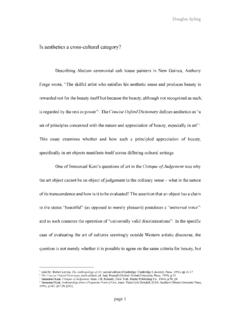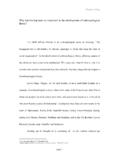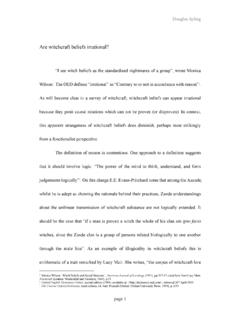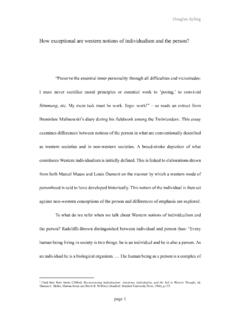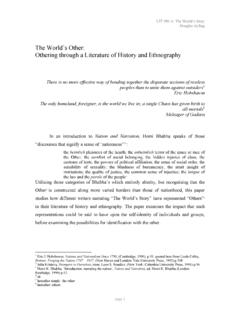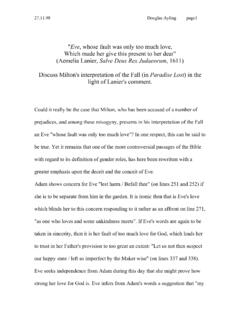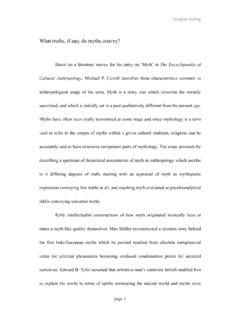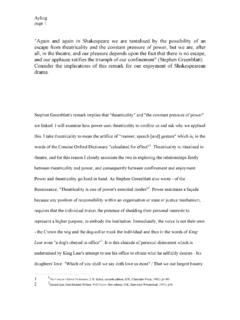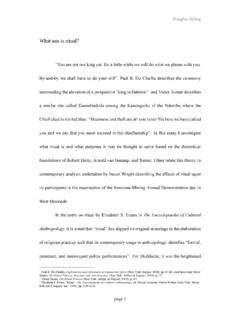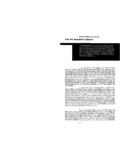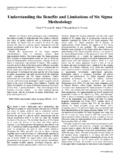Transcription of Il n'y a pas de hors-texte (Jaques Derrida). Does ...
1 Ayling page 1 "Il n'y a pas de hors-texte " (Jaques derrida ). Does contemporary fiction tend to confirm or resist the notion that there is no "outside-the-text"? "The author should die once he has finished writing. So as not to trouble the path of the text"1. Umberto Eco's provocative pronouncement, made whilst he himself was writing Reflections on 'The Name of the Rose', represents part of the debate about the origin of meaning with regard to text. In this essay, I shall examine how Possession and The Name of the Rose both confirm and resist derrida 's claim that "Il n'y a pas de hors-texte "2. The thrust of my argument is that Byatt's work resists the assertion and that conversely, the overall effect of Umberto Eco's novel is to confirm the remark.
2 It will be necessary first to explain what I understand derrida to have meant. I take "there is no "outside-the-text""3 to mean that the words within a text derive meaning, and the text receives meaning, not from a transcendental source, but from the relationships of the words within it to each other and the text to other texts. derrida places all writing within a process of defining meaning, therefore I would argue that "Il n'y a pas de hors-texte " should be taken to signify that meaning comes from texts or corpora, rather than from outside of writing. How is it possible to apply my understanding4 of what derrida 's phrase means, to an analysis of the texts? In order to resist the notion that "Il n'y a pas de hors-texte ", it is 1 1 Umberto Eco; Reflections on 'The Name of the Rose'; first edition; (UK; Martin Secker & Warburg Limited; 1985); 2 2 Jacques derrida ; 'The exorbitant.
3 Question of method'; pp. 157 - 164; Of Grammatology; Gayatri Chakravorty Spivak; (Johns Hopkins University Press; 1976); ; but quoted here from: Peter Barry, Beginning Theory: An introduction to literary and cultural theory; first edition; (Manchester; Manchester University Press; 1995); p. 70. 3 3 From question title. Ayling page 2 necessary to demonstrate that what is "outside of writing in general"5 does yet constitute its meaning. I will argue that assumptions about the unwritten thoughts of writers within the text, that sub-linguistic experience such as emotion, that the reality of the transcendental signified - however fictional; that these elements all lie outside of the text yet still constitute its meaning.
4 I test this proposition against the two texts by asking: In the texts, does writing animate reality, or does reality animate the words? By animate, I mean constitute the meaning of, vivify and give value to. To some extent, both Possession and The Name of the Rose resist the claim that "Il n'y a pas de hors-texte ". Both works see incidents whereafter writing is given fresh life and meaning through its contact with the realities of the novels. In The Name of the Rose, Adso's first sexual experience6 awakens for him an entire text, and the discourse of love. Subsequently, in reading Speculum amoris, by Maximus of Bologna - a study of the malady of love, Adso becomes sure that he is suffering from love-sickness.
5 "As the reader will understand, it did not require much once more to inflame my mind, which had been numb since morning, and to excite it again with the girl's image"7. The importance here of the real world outside textuality in giving birth to meaning, affirms a view of writing put forwards by the king in Plato's dialogue Phaedrus, "And as for wisdom, you're equipping your pupils with only a semblance of it, not with truth"8. 4 4 This is the definition I will be working with, along which this enquiry will proceed.
6 For an elaboration of its reasoning and justification, please see Appendix I. The nature of derrida 's writing unfortunately means that it is unworkable to present my evidence for this interpretation here. 5 5 Jacques derrida ; 'The exorbitant. question of method'; pp. 157 - 164; Of Grammatology; Gayatri Chakravorty Spivak; (Johns Hopkins University Press; 1976); ; but quoted here from: Peter Barry, Beginning Theory: An introduction to literary and cultural theory; first edition; (Manchester; Manchester University Press; 1995); p. 69. 6 6 Umberto Eco; The Name of the Rose; (UK; Picador; 1984); p. 246 7 7 Umberto Eco; The Name of the Rose; (UK; Picador; 1984); p.
7 322. 8 8 Plato; Phaedrus; 274e - 275e; but quoted here from Jacques derrida ; 'Plato's Pharmacy'; Literary Theory: An Anthology; first edition; Julie Rivkin and Michael Ryan; (UK; Blackwell Publishers; 1998); Ayling page 3 In Possession, when Roland Michell comes to reread The Golden Apples at the end of the novel, he manages to "know the writing differently or better or satisfactorily"9. This experience is described as rare, but authentic: "Now and then there are readings which make the hairs on the neck, the non-existent pelt, stand on end and tremble, when every word burns and shines hard and clear and infinite and exact"10. I would argue that the reason that the words have become like "living creatures or stones of fire"11 to Roland, is partly because of the texts uncovered in the novel - the letters between Christabel LaMotte and Randolph Henry Ash; but partly also as a result of the romance between Roland and Maud Bailey.
8 It is the unwritten, emotional experience of this romance, this Romance, which contextualises Ash's writing: "He saw too that Christabel was the Muse and Proserpina and that she was not"12. "He was in a Romance"13, we are told - of Roland - and although the elopement is written about, the text must stop at the limits of what can be expressed. "They did not speak of this, but silently negotiated another such night.. Speech, the kind of speech they knew, would have undone it.. Neither was quite sure how much, or what, all this meant to the other.. Neither dared ask"14. At the limits of the text lies sentiment which has not been brought into textual existence by categorisation or expression, but which nonetheless feeds Roland - and the text of The Golden Apples, as well as of the novel - with meaning.
9 That which lies outside the reality presented by the fictional work can still endow the words within with meaning. In The Name of the Rose, the second book of Aristotle's Poetics is the text outside the text. We have fragments of this text, "The shameless stone that rolls over the 9 9A. S. Byatt; Possession: A Romance; first edition; (UK; Vintage; 1991); p. 471. 10 10 Ibid. 11 11 Ibid.; p. 472. 12 12 Ibid. 13 13 Ibid.; p. 425. 14 14 Ibid.; p. 424. Ayling page 4 Before the eyes.. To them the cicadas will sing from the ground"15, we are even told that Brother William of Baskerville has been able to reconstruct the essence of the book by "reading other books.
10 Many of which Venantius was working on"16; but the text of this book is otherwise outside the frame of reference presented here. It is comparable to the mythical circular book in Borges' 'The Library of Babel', "whose spine is continuous and which follows the complete circle of the walls"17. This, like the second book of Poetics, is a book which cannot be read: "This cyclical book is God"18 - yet from outside the text, it animates much of the meaning of the writing. Similarly, the many hours of prayer which the monks mentally offer up to God19 are also closed texts. Unvocalised prayer is arguably in a liminal position with relation to language, as a palimpsest of internally enunciated thoughts and sub-linguistic ideas.

